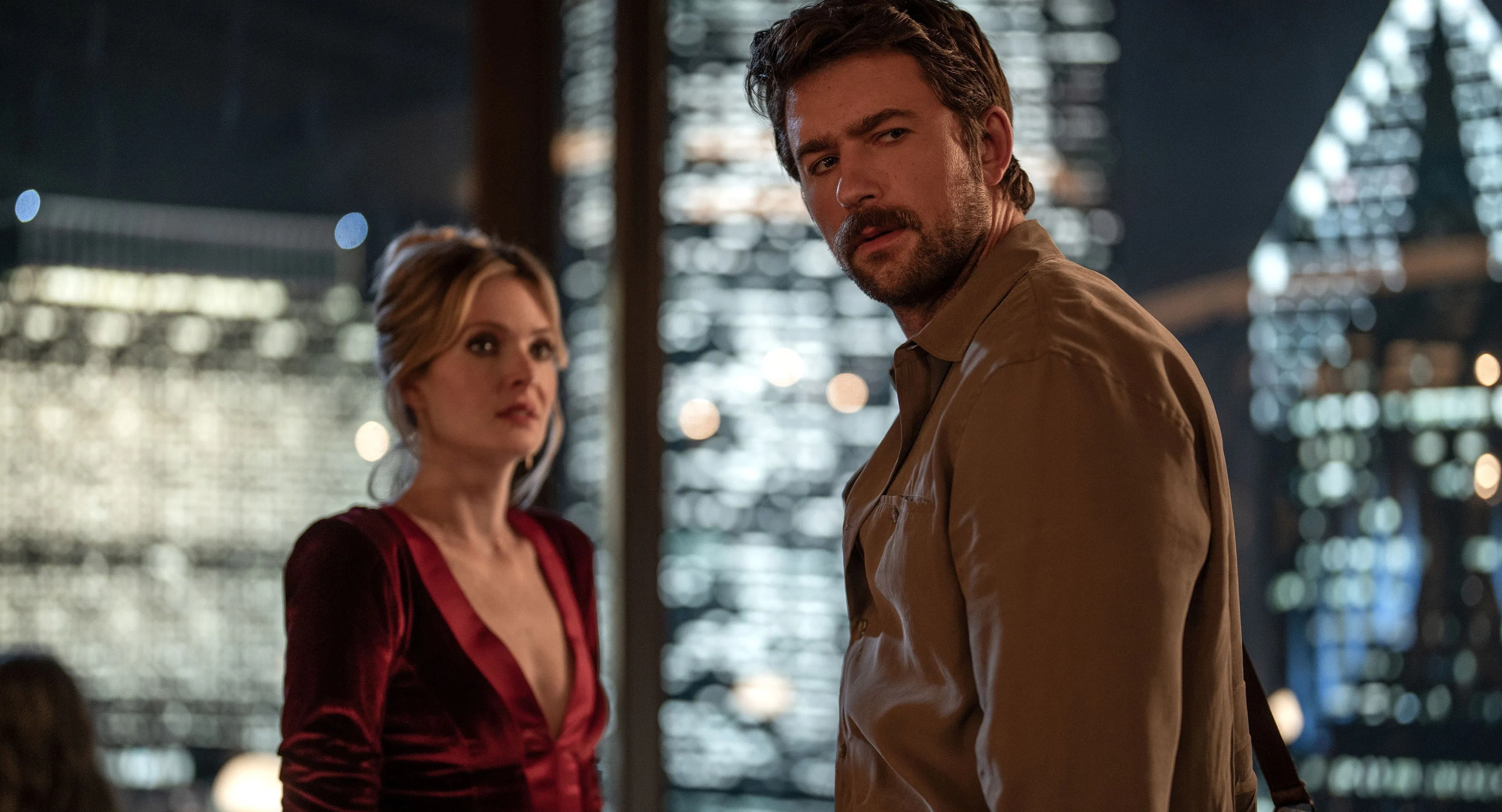Drop – Film Review
Published April 12, 2025

In Drop, director Christopher Landon (Happy Death Day, Freaky) trades supernatural body-swaps for a grounded, nerve-shredding thriller set in a single, sleek high-rise restaurant. Working from a taut script by Jillian Jacobs and Chris Roach, Landon crafts a tightly wound chamber piece with digital-age paranoia, emotional stakes, and escalating dread. Anchored by a commanding performance from Meghann Fahy, Drop isn’t just a thriller—it’s a ticking time bomb of psychological torment, familial love, and corporate corruption.
At its center is Violet (Fahy), a widowed mother navigating the early stages of dating after the traumatic suicide of her abusive husband, Blake. The emotional vulnerability of Violet’s character is crucial to the film’s success, and Fahy brings a compelling balance of strength, fear, and subtle optimism. Her attempt at re-entering the dating world leads her to “Palate,” an upscale rooftop restaurant where she’s arranged to meet Henry (Brandon Sklenar), a charming, soft-spoken city photographer she’s been chatting with online.
But things begin to unravel before he even arrives. Violet is plagued by mysterious “Digi-Drops”—a blend of harmless memes and progressively menacing messages that shift from unsettling to outright horrifying. While the term “drop” may sound benign, the film makes it ominous through clever pacing, ominous audio cues, and the growing realization that someone in the restaurant is watching Violet. The sleek, almost too-pristine atmosphere of Palate—complete with a smooth pianist (Jeffery Self) and a scattering of diners—starts to feel increasingly claustrophobic as Violet is ensnared in an elaborate cat-and-mouse game.
Landon masterfully builds tension with spatial precision. Every table, glance, and corridor feels suspect. The cinematography, cool and composed, contrasts sharply with Violet’s growing internal panic, making the setting itself feel like a silent predator. When Henry finally arrives, the story shifts gears from flirtatious awkwardness to tense suspicion. Brandon Sklenar’s performance as Henry walks a careful line: is he the only ally Violet has, or is he somehow involved?
Rather than leaning solely on whodunnit mechanics, Drop is more interested in the how and why. The film thrives in its ability to slowly peel back the layers of Violet’s trauma and strength. As her situation worsens—eventually witnessing a home invasion through her own security cameras and being blackmailed into silence—we see a woman being pushed to the brink in real time. Fahy captures every flicker of hesitation and resolve, carrying the film through even its most implausible twists.
There’s a fascinating interplay between Violet and the cast of characters around her, particularly the enigmatic Richard (Reed Diamond). Meanwhile, Violett Beane as Jen provides some grounded human warmth that serves as both a red herring and an emotional tether. Jeffery Self’s Phil, too, provides an intriguing counterweight—his scenes, light on dialogue but heavy on mood, add subtle texture to the ensemble.
The film’s use of technology is notable and highly effective. Rather than relying on gimmicky visualizations of texts and apps, Landon and the writers integrate modern tech anxiety organically into the plot. The concept of “Digi-Drops”—a fictionalized but plausible evolution of digital messaging—feels right at home in a world where surveillance and data manipulation are everyday concerns. The idea that Violet can’t even trust her own phone, her date, or the people around her lends Drop a chilling, Black Mirror-like undertone.
Where the film truly excels is in its pacing and structure. Though confined to mostly one location for much of its runtime, the film never feels stagnant. Each new development raises the stakes, and just when the situation seems to plateau, it jolts forward again with a new revelation or threat. The tension is sometimes suffocating, particularly in the film’s second act, where Violet is forced to make increasingly difficult decisions with impossible stakes.
If there’s a drawback, it’s that Drop occasionally edges toward the melodramatic. Some twists, particularly in the final act, require a mild suspension of disbelief. A few characters are underdeveloped—specifically some of the diners and side figures whose motivations feel more like plot devices than fully fleshed-out individuals. But these are minor criticisms in a film so confident in its tone and so carefully constructed.
The emotional payoff in the third act—without getting into spoilers—is well-earned. Violet’s arc, from a cautious woman afraid to re-enter the world to someone forced to confront both internal and external threats head-on, is compelling and cathartic. The relationship between her and her young son Toby is understated but essential. The stakes are never abstract—there’s a child’s safety and a family’s future on the line—and that gives Drop a grounding, emotional anchor that’s missing from many thrillers of this kind.
Brandon Sklenar’s Henry turns out to be more than a pretty face, and the chemistry between him and Fahy adds a bittersweet layer to the escalating danger. The film doesn’t need to lean into romance, but it does, gently and effectively, never forgetting that vulnerability and connection are just as dangerous—and necessary—as deceit and power.
The technical elements—score, lighting, and editing—are all top-notch. The music subtly morphs throughout the film, moving from elegant ambiance to urgent pulses without drawing too much attention to itself. The use of camera angles and close-ups heightens Violet’s isolation without feeling gimmicky. It’s a confident, sleek production that knows when to hold back and when to go all in.
Drop is a smart, stylish thriller that understands the fears of the digital age but roots them in very human emotions: grief, love, and trust. It balances its high-concept tension with grounded performances, particularly from Meghann Fahy, whose turn as Violet deserves recognition. Christopher Landon once again proves he’s not just a genre director—he’s a filmmaker who knows how to use suspense as a tool to explore deeper truths. It’s a harrowing night out—and one that audiences won’t soon forget.
